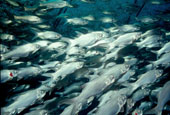World fisheries to collapse by 2050: report
 Vancouver, Canada (GLOBE-Net) – According to a new analysis of marine ecosystems data, all commercial fisheries and marine life harvested for human consumption, including tuna, swordfish, mussels, clams, oysters and shrimp, could be in total collapse by 2048. The research, led by Dr. Boris Worm of Dalhousie University, looked at historical records and scientific data to conclude that current fishing trends are unsustainable; but the decline can be reversed.
Vancouver, Canada (GLOBE-Net) – According to a new analysis of marine ecosystems data, all commercial fisheries and marine life harvested for human consumption, including tuna, swordfish, mussels, clams, oysters and shrimp, could be in total collapse by 2048. The research, led by Dr. Boris Worm of Dalhousie University, looked at historical records and scientific data to conclude that current fishing trends are unsustainable; but the decline can be reversed.The peer-reviewed research appears in the latest version of the international journal Science.
Researchers studied scientific data on marine ecosystems and fish catches from the U.N. Food and Agriculture Organization going back to 1950. In some cases, historical records and sediment samples going back 1000 years were used.
The data showed that marine biodiversity - the variety of fish, shellfish, plants and marine organisms - has declined sharply, with twenty-nine percent of species already in ‘collapse’, defined as having catches reduced by 90 percent.
Extending these trends, the scientists concluded that by 2048, all commercial species would be in collapse. This applies to all marine life harvested for human consumption, including tuna, swordfish, mussels, clams, oysters and shrimp.
The rate of collapse has increased: in 1980, just 13.5 percent of fished species had collapsed. Now, the fishing industry harvests 7,784 species commercially - 1,736 more than in 1980.
All marine life will be affected, including ocean mammals, as declining biodiversity reduces the ocean’s overall ability to support life and process waste.
In 12 marine ecosystems studies, it was found that a 50 percent or more decline in biodiversity cut the number of viable fisheries by one-third, and reduced ‘nursery habitats’ for young species by 69 percent. The ocean’s natural capacity to filter and detoxify contaminants was also cut by 63 percent.
Worm said that the same trend was present in all areas analysed, from tide pools to the world’s oceans. Overall, the marine ecosystem is getting weaker globally. Depleted ecosystems are vulnerable to invasive species, disease outbreaks, coastal flooding and noxious algae blooms, it was found.
Certain kinds of aquaculture can be beneficial, including the traditional Chinese farming of carp using vegetable waste. But raising carnivorous fish such as salmon is less effective and more likely to cause harm to the marine ecosystem, the researchers noted.
On a positive note, the research indicated that improved management and regulation can help the ocean recover. In fifty areas where restrictions prevented overfishing, the range of species increased by 23 percent on average over five years. It is not too late, but action must be taken soon, the researchers warned.
Canada opposes UN moratorium on bottom trawling
One example of an international initiative to increase the sustainability of ocean fishing is a proposed United Nations moratorium on bottom trawl fishing in international waters. Bottom trawling involves dragging heavy nets across the sea bottom, preventing fish from escaping the nets but damaging coral formations and many non-targeted species. Some have equated this practice to “clear cutting” in the forestry sector.
The United States, Australia, the United Kingdom, New Zealand, Norway and Brazil support the resolution. Canada, Spain, Iceland and Japan are in opposition, which means the resolution will likely not pass. U.S. President George Bush called upon the international community to end “destructive fishing practices” such as bottom trawling.
Canada currently permits bottom trawling in domestic waters, and would like to see improved ocean management rather than a total ban. Federal Fisheries Minister Loyola Hearn said that a better option would be to extend the reach of the Northwest Atlantic Fisheries Organization (NAFO), which regulates fishing outside of Canadian waters.
You can return to the main Market News page, or press the Back button on your browser.

